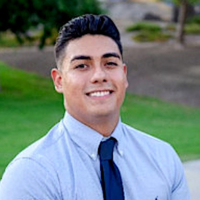Alumni Offer Advice on an Uncertain Job Market Class of 2020 hears words of encouragement from two who graduated during the Great Recession
By Mary Braswell
Joey Shanley and Andy Sywak know what it’s like to look for a job in an economy shaken by uncertainty. The two UCLA Luskin alumni graduated in 2009 as the nation struggled to emerge from the Great Recession.
Each embarked on career paths that took surprising-but-welcome turns, and each emerged with insights about job strategies that work, including adjusting your mindset to weather unpredictable times.
At an online panel hosted by UCLA Luskin Career Services, Shanley and Sywak shared their wisdom with graduates entering the workforce during a downturn that has eclipsed the recession of a decade ago. Their words of advice to the Class of 2020 were both practical and encouraging.
“You have a master’s degree from one of the top top-tier universities in the world. I don’t have a crystal ball. I can’t tell you when you will find a job, but I will tell you that you will find a job,” said Shanley, who earned his master’s in social welfare and now manages transgender care programs at Kaiser Permanente Southern California.
Before and after he earned his master’s in public policy, Sywak worked in journalism, government, nonprofits and the private sector. He now uses policy and planning skills as a compliance manager for the West Hollywood startup AvantStay, which specializes in high-end short-term rental properties.
In each position he has held, Sywak pursued his longstanding interest in local government, and he encouraged students to “find that common thread” when presenting resumes with a wide range of experiences.
‘The thing that we always look for is people who can create solutions.’ — Andy Sywak MPP ’09
Shanley pursued politics and film before dedicating his life to social work, and even then a few unexpected turns awaited him.
“If you pulled me aside five years ago and said, you know, Joey, you’re going to be neck-deep in transgender health, I would have said that sounds great but that’s not my career path,” said Shanley, who manages Kaiser’s gender-affirming surgery program and is helping to launch a pediatric transgender care clinic.
“This is where my career has gone, and it’s been beyond even my wildest hopes.”
The May 29 panel launched a series of Career Services activities aimed at supporting students and alumni throughout the summer. At the next event, a Zoom conversation on July 7, Marcia Choo, vice president of community development at Wells Fargo Bank, will discuss how to align career decisions with equity and social justice.
Shanley and Sywak invited freshly minted policy, planning and social welfare graduates to remain in touch, to seek career advice or simply to strengthen the UCLA Luskin alumni connection.
The power of networking can be tapped well before graduation, Shanley noted. He recalled poring over the entire list of MSW field placements, then scouring websites of employers that piqued his interest. Whether or not they had active job listings, he reached out to set up introductory meetings and always followed up with both an email and a written note.
“I’m still old school,” he said, and hiring managers may be, too. “When all the candidates look equal but there’s a nice, handwritten thank-you card from you, that’s going to actually help elevate your position in the rankings.”
Both in interviews and on the job, the ability to communicate clearly and think creatively are key, Sywak added.
“When you work at a startup, people are given pretty big responsibilities pretty easily. … The thing that we always look for is people who can create solutions,” he said.
The COVID-19 pandemic has made certain skill sets essential on the job, the alumni added. Employees who have transitioned to a virtual environment, with clients or with colleagues, should master new technologies, design skills and ways of communicating to remain relevant, they said.
Both Shanley and Sywak counseled the graduates to view their hard-won master’s degrees as the beginning, not the end, of their education.
“There’s a lot that we can learn in those first few years out of grad school,” Shanley said. “Make sure that you’re listening, make sure you continue to have curiosity. …
“Especially now, life is hard for everybody. Make sure that you can funnel that into a place that’s effective in the workplace. Help find the solutions.”

